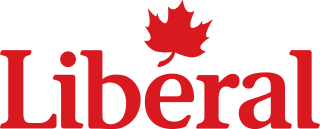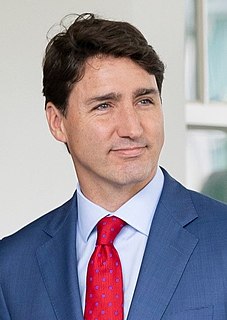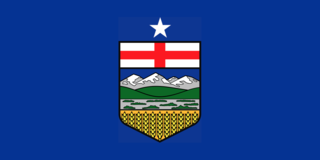Related Research Articles
The politics of Canada function within a framework of parliamentary democracy and a federal system of parliamentary government with strong democratic traditions. Canada is a constitutional monarchy, in which the monarch is head of state. In practice, the executive powers are directed by the Cabinet, a committee of ministers of the Crown responsible to the elected House of Commons of Canada and chosen and headed by the Prime Minister of Canada.

Joseph Philippe Pierre Yves Elliott Trudeau, also referred to by his initials PET, was a Canadian lawyer and politician who served as the 15th prime minister of Canada from 1968 to 1979 and 1980 to 1984. He also briefly served as the leader of the Opposition from 1979 to 1980. He served as leader of the Liberal Party of Canada from 1968 to 1984.

Charles Joseph Clark is a Canadian statesman, businessman, writer, and politician who served as the 16th prime minister of Canada from June 4, 1979, to March 3, 1980.

The Liberal Party of Canada is the longest-serving and oldest active federal political party in Canada. The party has dominated federal politics of Canada for much of its history, holding power for almost 70 years of the 20th century. As a result, it has sometimes been referred to as Canada's "natural governing party".
The Conservative Party of Canada, colloquially known as the Tories, is a federal political party in Canada. It was formed in 2003 by the merger of the two main right-leaning parties, the Progressive Conservative Party and the Canadian Alliance, the latter being the successor of the Western Canadian-based Reform Party. The party sits at the centre-right to the right of the Canadian political spectrum, with their federal rival, the Liberal Party of Canada, positioned to their left. The Conservatives are defined as a "big tent" party, practising "brokerage politics" and welcoming a broad variety of members, including "Red Tories" and "Blue Tories".

A. Anne McLellan is a Canadian academic and politician who served as the ninth deputy prime minister of Canada from 2003 to 2006. She was a cabinet minister in the Liberal governments of Jean Chrétien and Paul Martin, and represented Edmonton in the House of Commons of Canada. She also held the positions of Solicitor General, Minister of Health, and Minister of Justice of Canada.

The 1984 Canadian federal election was held on September 4, 1984, to elect members to the House of Commons of the 33rd Parliament of Canada.

Justin Pierre James Trudeau is a Canadian politician who is the 23rd and current prime minister of Canada since November 2015 and the leader of the Liberal Party since April 2013. Trudeau is the second-youngest prime minister in Canadian history after Joe Clark; he is also the first to be the child or other relative of a previous holder of the post, as the eldest son of Pierre Trudeau.

The 1979 Canadian federal election was held on May 22, 1979, to elect members of the House of Commons of Canada of the 31st Parliament of Canada. It resulted in the defeat of the Liberal Party of Canada after 11 years in power under Prime Minister Pierre Trudeau. Joe Clark led the Progressive Conservative Party to power but with only a minority of seats in the House of Commons. The Liberals, however, beat the Progressive Conservatives in the overall popular vote by more than 400,000 votes. Taking office on the eve of his 40th birthday, Clark became the youngest prime minister in Canadian history.
Charles L. Caccia, was a Canadian politician. Caccia was a Liberal member of the House of Commons of Canada. He represented the Toronto riding of Davenport between 1968 and 2004.

A Blue Tory in Canadian politics is a conservative who advocates for free-market or economically liberal policies. The term has been applied to members of the modern Conservative Party of Canada and provincial Progressive Conservative parties, as well as the historical Progressive Conservative Party of Canada, Reform Party of Canada and Canadian Alliance.
The 1968 Liberal Party of Canada leadership election was held on April 6, 1968. The election was won by Minister of Justice and Attorney General Pierre Elliott Trudeau, who became the new Prime Minister of Canada as a result. He was the unexpected winner in what was one of the most important leadership conventions in party history. The Globe and Mail's newspaper report the next day called it "the most chaotic, confusing, and emotionally draining convention in Canadian political history."
Marc Lalonde is a Canadian retired politician and cabinet minister.
Victoria was one of the original 25 provincial electoral districts in Alberta, named for Fort Victoria on the North Saskatchewan River. It was mandated to return a single member to the Legislative Assembly of Alberta by the first past the post method until 1917, and by instant-runoff voting from 1926 until it was abolished in 1940.

Alberta separatism comprises a series of 20th and 21st century movements advocating the secession of the province of Alberta from Canada, either by joining the United States of America, forming an independent nation or by creating a new union with one or more of Canada's western provinces. The main issues driving separatist sentiment have focused primarily on the perceived power disparity relative to Ottawa and other provinces, historical grievances with the federal government dating back to the unrealized Province of Buffalo, a sense of distinctiveness with regards to Alberta’s unique cultural and political identity, and Canadian fiscal policy, particularly as it pertains to the energy industry.

Fuck is a 2005 American documentary film by director Steve Anderson about the word "fuck". The film argues that the word is an integral part of societal discussions about freedom of speech and censorship. It examines the term from perspectives which include art, linguistics, society and comedy, and begins with a segment from the 1965 propaganda film Perversion for Profit. Scholars and celebrities analyze perceptions of the word from differing perspectives. Journalist Sam Donaldson talks about the versatility of the word, and comedian Billy Connolly states it can be understood despite one's language or location. Musician Alanis Morissette comments that the word contains power because of its taboo nature. The film features the last recorded interview of author Hunter S. Thompson before his suicide. Scholars, including linguist Reinhold Aman, journalism analyst David Shaw and Oxford English Dictionary editor Jesse Sheidlower, explain the history and evolution of the word. Language professor Geoffrey Nunberg observes that the word's treatment by society reflects changes in our culture during the 20th century.
The business case for diversity stems from the progression of the models of diversity within the workplace since the 1960s. In the United States, the original model for diversity was situated around affirmative action drawing from equal opportunity employment objectives implemented in the Civil Rights Act of 1964. Equal employment opportunity was centered around the idea that any individual academically or physically qualified for a specific job could strive for at obtaining the said job without being discriminated against based on identity. This compliance-based model gave rise to the idea that tokenism was the reason an individual was hired into a company when they differed from the dominant group. Dissatisfaction from minority groups eventually altered and/or raised the desire to achieve perfect employment opportunities in every job.
The New Democratic Party is a social democratic federal political party in Canada. The party was founded in 1961 by the Co-operative Commonwealth Federation (CCF) and the Canadian Labour Congress (CLC). On the political spectrum, the party sits to the left of the Liberal Party.
Multiculturalism in Canada was officially adopted by the government during the 1970s and 1980s. The Canadian federal government has been described as the instigator of multiculturalism as an ideology because of its public emphasis on the social importance of immigration. The 1960s Royal Commission on Bilingualism and Biculturalism is often referred to as the origin of modern political awareness of multiculturalism.
Kiss up kick down is a neologism used to describe the situation where middle-level employees in an organization are polite and flattering to superiors but abusive to subordinates. The term is believed to have originated in the US, with the first documented use having occurred in 1993. A similar expression was used by Swedish punk band Ebba Grön in one of their songs, on an album released in 1981. The concept can be applied to any social interaction where one person believes they have power over another person and believes that another person has power over them.
References
Citations
- ↑ Dalzell & Victor 2015, p. 297.
- 1 2 Sarra 2013, p. 279.
- 1 2 Barrett, Tom (August 8, 2005). The Video that Outrages Telus Employees. The Tyee . Retrieved October 14, 2017.
Lewd 'team building' party, caught on tape, further soured relations inside phone firm.
- ↑ Ash 2016, p. 62.
- ↑ Saunders, Skye; Easteal, Patricia Lynn (2012). "'Fit in or F#$@ Off!': The (Non) Reporting of Sexual Harassment in Rural Workplaces'". International Journal of Rural Law and Policy. 2: 1–17. doi: 10.5130/ijrlp.i2.2012.3127 . ISSN 1839-745X.(subscription required)
- ↑ Ward, Trevor (March 26, 2013). "An Englishman in Scotland The English and the Scots have always had a bit of a turbulent relationship but Sabotage Times discovers that what was once refered[sic] to as "friendly banter" has now boiled over into full blown racism". Sabotage Times . Retrieved October 11, 2017.
- ↑ Buerk 2005, p. 96.
- ↑ Bivens 2014, p. 143.
- ↑ "Trudeau Liberal candidate tells Albertans to 'fit in or f-ck off'—Conservative MP responds". CANADIAN NEWS. August 20, 2021.
In response to recent revelations that Trudeau Liberal candidate for Calgary Nose Hill Jessica Dale-Walker told Alberta to "fit in or f-ck off," Michelle Rempel Garner, a Conservative candidate for Calgary Nose Hill, slammed both Walker and Prime Minister Trudeau in a statement.... Dale-Walker said that Alberta is "not trying hard enough to fit in."
Bibliography
- Ash, Angie (May 19, 2016). Whistleblowing and Ethics in Health and Social Care. City: Jessica Kingsley Publishers. p. 62. ISBN 9781784501082.
- Bivens, Rena (January 2014). Digital Currents: How Technology and the Public are Shaping TV News. Toronto: University of Toronto Press, Scholarly Publishing Division. p. 143. ISBN 978-1-4426-1586-1.
- Buerk, Michael (September 27, 2005). The Road Taken. London: Arrow Books. p. 96. ISBN 9780099461371.
- Dalzell, Tom; Victor, Terry, eds. (2015). The Concise New Partridge Dictionary of Slang and Unconventional English. Routledge. p. 297. ISBN 978-1-4426-1586-1.
- Holman, Rebecca (August 2017). Beta: Quiet Girls Can Run the World: There is more than one way to be the boss. London: Coronet Books, an imprint of Hodder & Stoughton. pp. 123–124. ISBN 978-1-4736-5620-8.
- Sarra, Chris (January 1, 2013). Good Morning, Mr Sarra: My Life Working for a Stronger, Smarter Future for Our Children. St. Lucia, Queensland, Australia: University of Queensland Press. p. 279. ISBN 978-0-7022-4908-2.
- Strichow, Hans (December 19, 2013). My Life in a Nutshell: Life Is All About Fun, Frustration, and Fulfillment. Balboa Press. p. 117. ISBN 978-1-4525-1244-0.